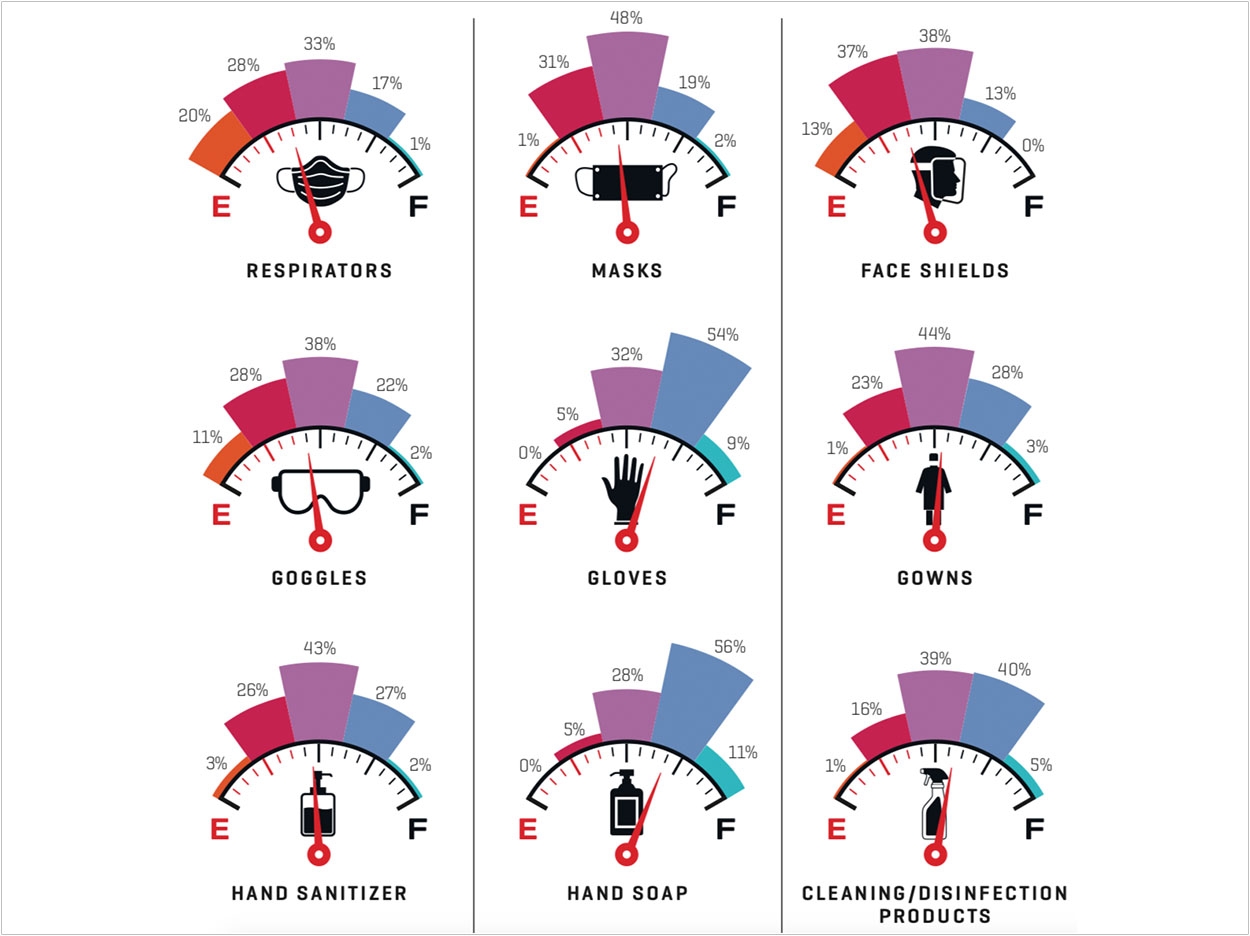
Nearly half (48%) of healthcare facilities in the United States are already out of or almost out of respirators to use in caring for a patient with COVID-19, according to a national online survey of infection prevention experts conducted between March 23 and March 25 by the Association for Professionals in Infection Control and Epidemiology (APIC).
The survey asked APIC’s US-based infection preventionist members to categorize their supply of personal protective equipment (PPE) and other items including hand sanitizer and cleaning products on a five-point scale from having “plenty” to “none.”
Of the 1,140 infection preventionists who completed the survey, 233 (20.46%) said their facilities have no respirators. Also, 317 (27.83%) said they are almost out of these devices. Nearly half (560 or 49.16%) said they don’t have enough face shields, 416 (36.52%) are almost out, and 144 (12.64%) are completely out.
Furthermore, 31% are almost out or completely out of masks. More than one in four facilities (322 or 28.27%) are in short supply of hand sanitizer, with 292 (25.64%) almost out and 30 (2.63%) completely out.
APIC calls on the federal government to immediately activate the Defense Production Act and any other means at its disposal to get the supplies needed to safely treat COVID-19 patients and protect healthcare workers at the frontlines of this pandemic.
“Immediate action is needed to protect healthcare workers and save lives. Every minute matters. Healthcare providers need clarity, not confusion,” said 2020 APIC president Connie Steed, MSN, RN.
“They need to know when exactly they can expect desperately needed supplies to arrive so they don’t have to turn to unproven crisis methods for PPE. There have been grim reports from health officials about the supply shortage for weeks, and we’re not getting any answers. This is unacceptable,” said Steed.
Infection preventionists develop evidence-based practices to prevent the spread of infection, APIC said, including protocols for hand hygiene and the proper use of personal protection equipment (PPE).
“As the COVID-19 pandemic continues to sweep the country and place an extreme burden on the US healthcare system, shortages of critical PPE and disinfection supplies will severely jeopardize our ability to safely treat patients and protect healthcare workers who are putting their lives on the line to fight this disease,” said APIC CEO Katrina Crist, MBA.
“As it stands now, infection preventionists are being forced to recommend unproven measures for PPE. Some healthcare workers have even resorted to do-it-yourself approaches, adding more risk,” said Crist.
Nearly 30% of respondents (599 or 29.35%) have accessed supplemental PPE through state or local sources. A quarter (501 or 24.55%) have received private donations. About 17% (351 or 17.2%) have created their own such as sewing masks. Only 12.25% (250) report receiving supplies from the Strategic National Stockpile.
Among respondents, more than two-thirds (765 or 67.05%) have only one or less than one full-time equivalent infection preventionist on staff to devise safe protocols for protecting against COVID-19.
The COVID-19 pandemic is occurring during a severe flu season in which hospitals were already crowded, APIC said. The Centers for Disease Control and Prevention estimates that one in 31 hospitalized patients will develop a healthcare-associated infection, and 75,000 patients die each year. Consistent use of proven infection prevention measures, including proper PPE, can prevent many healthcare-associated infections, APIC said.
“Hospitals and health facilities with fewer than one full-time person on staff to direct infection prevention activities may have been disadvantaged even before the COVID-19 pandemic,” said Steed. “I am concerned that many facilities will not be able to protect healthcare workers and patients from not only COVID-19, but also MSRA, C diff, and other antibiotic-resistant infections.”
Related Articles
Joint Commission Engages With Government in Managing PPE Shortages
Partnership to Develop Prototype Antiviral Masks
EU Takes Steps to Ensure PPE Supply


